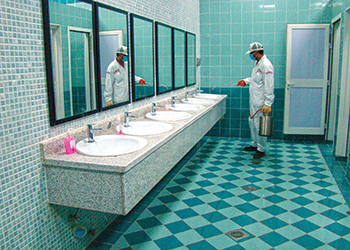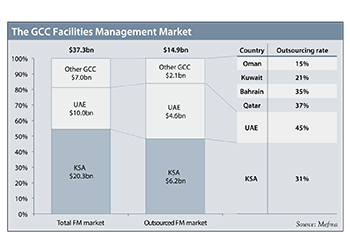
 Mousaied Al Shieshakly, owner of Masa.
Mousaied Al Shieshakly, owner of Masa.
To ensure proper operation of all aspects of a building and create an optimal environment for occupants, facility managers need to adopt a proactive pest prevention plan, says MOHAMMAD ARIF HUSSAIN*.
The pests and techniques used to manage them can greatly affect human health and safety. For example, allergens from insects and rodents can trigger or cause a host of human conditions and diseases when aerosolised particles of pest urine, droppings or remains become airborne and are inhaled. However, the excessive use of pesticides is equally undesirable and potentially hazardous. Experience has shown that applying integrated pest management (IPM) methods eliminates unnecessary pesticide use.Since facility management is an interdisciplinary field devoted to the coordination of space, infrastructure, people and organisation, managers must include a proactive pest prevention programme that is not only effective but is also environmentally responsible.
At the same time, IPM project managers have reported better results than when they mainly relied on pesticides to control pests. This is not surprising because IPM programmes are based, first and foremost, on averting pest problems by preventive methods such as improved sanitation, housekeeping, maintenance, growing healthy plants in well-designed landscapes, among other measures. Lack of training is often cited as an obstacle to the wider adoption of IPM methods. Whether pest management services are provided in-house or are outsourced, inadequate training could lead to an ineffective or dangerous pest management programme.
Traditional methods of pest control usually involve no more than periodic applications of pesticides. Landscapes associated with urban areas, public parks and gardens, golf courses, and lawns have traditionally been treated using chemicals extensively, thus increasing the risk and probability of pesticide exposure. There has been increasing demand for ways to reduce or eliminate use of pesticides in non-agricultural and structural settings.
For building managers, one pesticide-related issue that is gaining increasing attention is indoor and ambient air quality. While pesticides are not the only factor associated with poor air quality, they are often implicated as a contributing element. Even where air quality issues are not apparent, pesticide use is increasingly becoming a bone of contention with building occupants.
Another issue is of pesticides affecting water quality. The driveways and sidewalks (impermeable surfaces) around the urban landscapes do not have planted buffer zones. This creates a rapid runoff of pesticides applied to the lawn and landscapes, off the site to stormwater channels, creeks, watersheds and wetlands. Ground water is also vulnerable to leaching of pesticides.
 |
|
A Masa operator at a facility. |
As a result, building managers are being put under increasing pressure to address pesticide concerns, and account for pesticide use in their buildings. Many involved in this issue, ranging from pest control contractors to environmental groups, are putting IPM forward as the best means of balancing the need for pest control with the concerns pesticides may raise.
Ideally, once pest activity is noted, it is necessary to involve the facility manager or a secondary inspector who is familiar with the building and grounds and who knows the staff and the operation. This also assists in making sure that a time schedule is set to provide the preventive maintenance and corrective measures as needed.
In order to prevent the proliferation of pests, facility managers should promptly follow recommendations made by the pest management inspectors. They should also focus on facility self-inspections (self/or designated staff) and corrective measures on general sanitation, housekeeping and maintenance. These are precautionary measures to eliminate or minimise conditions conducive to pests, thus preventing their infestation and subsequently the need for pesticide applications.
IPM is an effective and environmentally-sensitive approach to pest management that relies on a combination of common sense practices. It uses current, comprehensive information on the lifecycle of pests and their interactions with the environment. This information, in combination with available pest control methods, is used to manage pest damage by the most economical means, and with the least possible hazard to people, property, and the environment. The IPM programmes take advantage of all pest management options possible, including the judicious use of pesticides.
Saudi-based Masa Establishment for Pest Extermination, Maintenance and Contracting offers professional and reliable services to facilities management companies, which are delivered by its expert team of highly skilled pest control technicians. Its staff is well trained in IPM techniques, and all its services are tailored to each individual property and to the individual needs of the business in question to ensure the best possible results.
Masa’s expert team partakes in detailed discussions with the involved facilities managers prior to starting any work to establish the required frequency and level of service that is required.
Masa has a proven track record of 35 years in the field of pest control in delivering quality and effective results, which are obtained through the use of a wide range of tried-and-tested pest control solutions.
*Mohammad Arif Hussain is an entomologist at Jeddah-based Masa Establishment for Pest Extermination, Maintenance and Contracting.





















_0001.jpg)


.jpg)
















.jpg)








.jpg)



